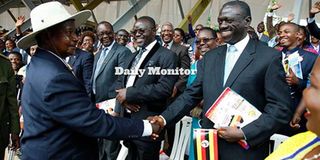Dialogue is the right way forward for our country

Memorable. President Museveni shakes hands with former FDC presidential candidate Dr Kizza Besigye in 2015 during the Popal mass at Namugongo. FILE PHOTO
What you need to know:
- The issue: Political dialogue.
- Our view: Uganda still needs a political dialogue for a smooth transition to take place.
This newspaper reported yesterday that the key principals in the ruling NRM government and the leading ruling Opposition party, the Forum for Democratic Change, have agreed on a mediator and process to kick-start political dialogue aimed at resolving the country’s political mess.
President Museveni and Dr Kizza Besigye have hardly seen eye-to-eye since their fall-out 18 years ago in 1998 when Dr Besigye jumped ship, claiming the Movement had veered off their original ideals. Their relationship has not only strained the two, but also poralised the country’s political landscape, so much so that the fall-out has been the epicentre of protests and demonstrations.
Just after the February 2011 general election, President Museveni warned Dr Besigye against staging protests. Dr Besigye and members of the Opposition nonetheless started the walk-to-work protests over a rising cost of living and inflation. This climaxed when the Opposition leader was doused in pepper spray at Mulago roundabout and left almost blinded. This sparked off outrage in the city and other parts of the country. And the political emotions have remained high since then.
There are countries that have experienced a more turbulent political climate than Uganda but dialogue has saved the day. For example, after the 2007 post-election violence in Kenya, president Mwai Kibaki and opposition leader Raila Odinga under the mediation of UN Secretary General Kofi Annan, signed a power-sharing agreement which resulted in the creation of a prime minister post.
In 2008, Zimbabwe walked the same path after years of violence against key opposition figures. President Robert Mugabe ceded some powers to opposition leader Morgan Tsvangirai who became prime minister.
We might not do it exactly the same way, but we should borrow the spirit. For instance, Besigye, a four-time challenger to President Museveni, recently told the media that he would be open to dialogue if the discussions were “properly structured” and had guarantees for implementation of the outcome.
What we now need is that the lieutenants – both in government and Opposition - should provide an enabling environment for dialogue to take place. Though Mr Harold Kaija, the FDC party deputy secretary general (In-charge of administration) claimed the reported dialogue between the two is a project that masqueraders are trying to crack, Uganda still needs a political dialogue for a smooth transition to take place.




